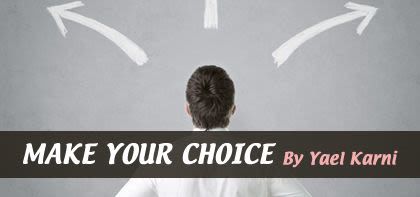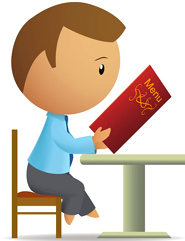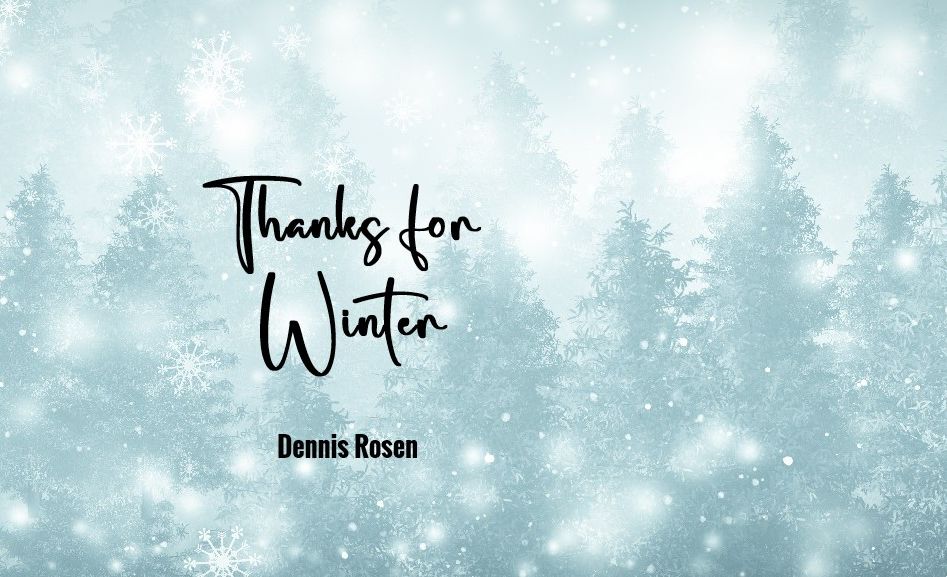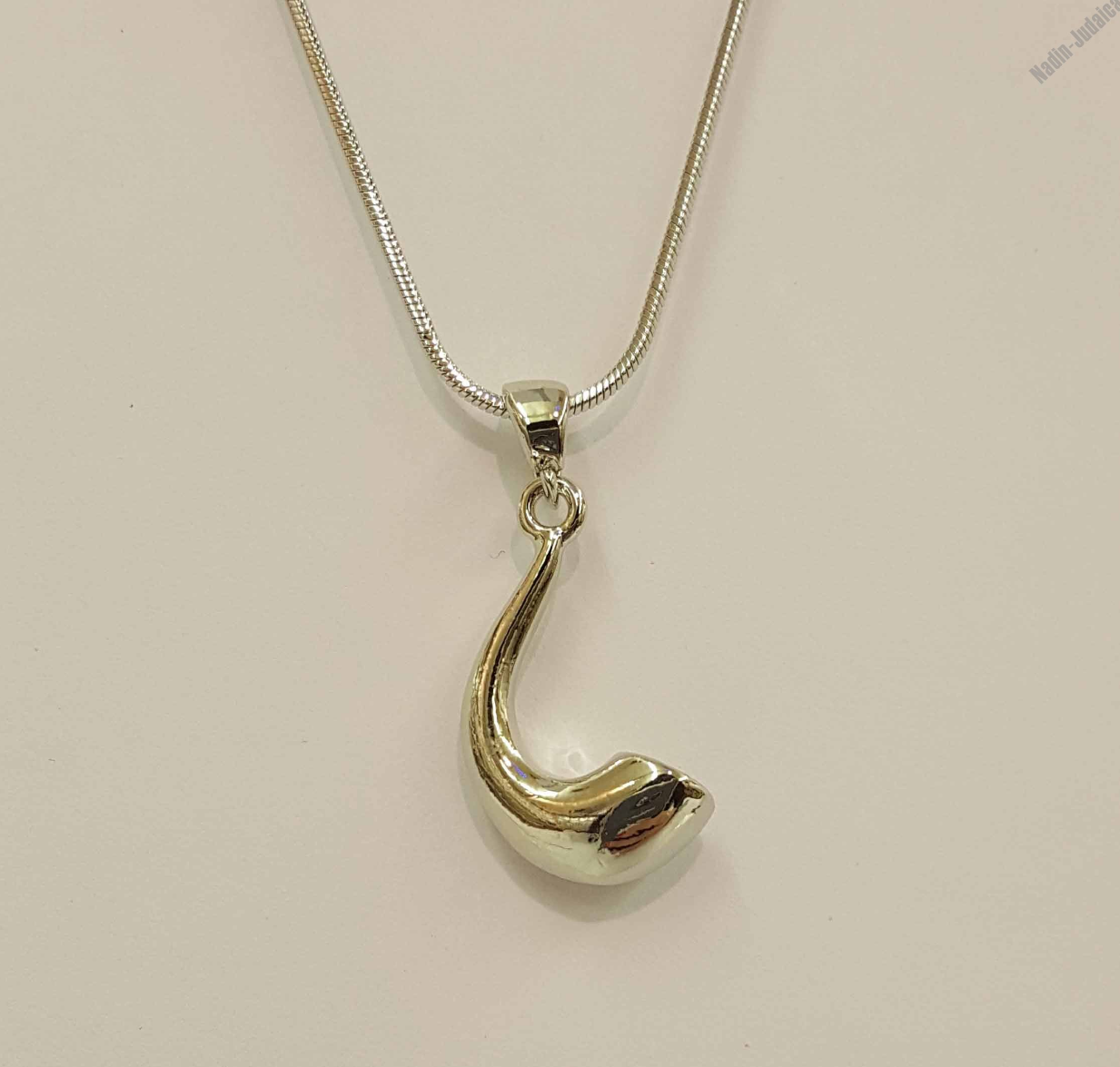
Make Your Choice
What I decide to have for breakfast doesn’t really fall under the category of free will, but whether it is kosher or not, and how I eat it, does...

"Well, that’s just the way I am. It just sort of happened. That’s just way I feel. Everybody else does it…"
Ever heard yourself or others say this? If you have, meet the anti-free will demon. This little critter sits on its throne situated in your head with its feet up on a royal stool and says, no you can’t, no you can’t, no you can’t….change.
But yes, you can…. if you understand what free will is.
Hashem gave the original man, Adam, a world that could only potentially be broken and told him don’t break it. But Adam sinned and the potential for evil was brought into reality. The Hebrew word for evil is ra, which comes from the root, to break. In other words, we live in a broken world and our task is to try and fix it. Before the sin in the Garden of Eden, Adam only understood truth and falsehood, it either was real or it wasn’t; after  the sin, he internalised a mixture of good and bad and the concept of doubt was created. Now we don’t see things at all clearly, good is mixed in with bad.
the sin, he internalised a mixture of good and bad and the concept of doubt was created. Now we don’t see things at all clearly, good is mixed in with bad.
So how does the Torah define free will? The Talmud states that a person’s free will is only in the area of yiras shamayim, fear or awe of Heaven. In other words, a person only has free will in the area of his or her moral decisions and since morality in the Torah equates with holiness, any decision making, as far as possible, should include whether this decision will take me closer to Hashem or further way. The Torah was given to the Jewish People with instructions [mitzvot] about how to sift out the good from the bad. And that’s where real choice comes in.
So what I decide to have for breakfast doesn’t really fall under the category of free will, but whether it is kosher or not, and how I eat it, does. What outfit I decide to wear today doesn’t fall under the category of free will, but whether I look modest and refined in it does.
I can’t decide who my parents are, the circumstances I will grow up in, what my genetic code will be, what my mix of personality traits will be but I can decide how I will use the setting and those traits that Hashem has given me to serve Him.
I also have free will at a certain level [nekudot habechirah/point of free will] ie, below that point of free will I won’t have a challenge, ie I won’t be tempted to rob anyone, it would be beneath me; above my point of free will I also won’t be judged on my choice, because it’s beyond my ability or circumstances. I’m only accountable for a choice I can realistically make.
I’ve met women over the years who have literally transformed their lives through making a decision to commit to a Torah life. They’ve had to make life changing decisions, giving up a promising career in law because she couldn’t take time off for Shabbat but now married and involved in drawing other women close to Torah, giving up a promising career on the stage because she realized it wasn’t very modest but now married and teaching dance to women only and supporting her head teacher husband of a Jewish school, artists who now only produce absolutely stunning paintings based on Torah themes and settings. None of their decisions would have been easy or the transition even imaginable to them initially, but Hashem has helped them all to utilize their divine talents in His service without having to make a personal sacrifice; in fact, they’ve all gained immeasurably. How did they do it? By making a choice.
I remember a while back when I started learning Torah, I had a choice of two new classes to attend. One was on the laws of prayer and the other on the laws of Shabbat. Having always thought of myself as not very academic I was tempted to take the path of least resistance and go the class on prayer because I knew I’d understand it. The Shabbat class I knew would stretch me and I thought I wouldn’t really understand it, that it would be too difficult and yet there was a little voice saying, you know Yael, at your stage now you really ought to be learning these laws, just try the class and if you don’t understand, well at least you’ve tried. In the end I made a decision to try the Shabbat class and to my surprise, I actually understood it [well most of it]. It helped that I had a brilliant teacher who on occasion when I didn’t understand something, in his humility told me it wasn’t me, it was him, he obviously wasn’t teaching it properly. Learning Jewish law was for me a real challenge, it wasn’t something that came naturally but what I learned which was more important was that you only have to make an effort and Hashem will make an opening a pour His light on you. He wants me to learn halacha so He helps me.
Aah, you might say, it’s alright for you but my situation is different. Of course, it’s true, everybody’s situation is unique and therefore no-one can say exactly how anyone else should proceed unless they have good counsel.
However, one thing everyone has within them is the ability to change the way they think because no feeling or action happens without a prior thought, even if we are initially unaware of it. And what precedes thought? A person’s desire for something. And what we desire is also a choice. I choose what I want to want. I choose how I want to feel. I choose what I want to do. I choose to learn emunah. I choose to be happy. I choose to be close to Hashem. And what I choose will be mirrored by Hashem’s response to me and all of klal Israel. May it only be good, amen.










Tell us what you think!
Thank you for your comment!
It will be published after approval by the Editor.